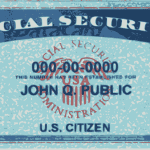The primaries are over just as they have begun. No cash accepted. And are the Nones growing or shrinking?
Well, the Iowa caucuses and the New Hampshire primary have crowned Donald Trump and Joe Biden to be their party’s candidates for president.
Even though the Democratic Party isn’t accepting the results, blackballing those state’s traditional first-in-the-nation status so as to give that distinction to South Carolina, which came through strongly for Biden in the last election.
It’s strange that these two early states should determine the outcome for the rest of the country, effectively taking away the chance for other states to weigh in. But Iowa and New Hampshire gave credence to the opinion polls, so all of Trump’s opponents have withdrawn, except for Nikki Haley.
I think it’s important that someone stay in the race, since we don’t know what Trump’s legal troubles will mean for the general election. And both of the candidates are really old and showing it.
Here is my theory about the Democrats: Contrary to what many were expecting, I don’t think the Democrats will pressure Biden to withdraw in favor of a younger and potentially more popular candidate. The progressive wing loves it that Biden is so old and will grow older through his term. If Biden should die in office, the presidency would go to a radically progressive black woman! That would fulfill the dream of the woke left, who could never get one of their number elected the regular way.
“No Cash Accepted”
More and more businesses are no longer accepting cash. It’s true that more and more customers are paying with credit cards for just about everything, and by only accepting credit cards, businesses can simplify their bookkeeping and avoid the hassle of cash registers, making change, hauling money to the bank, and risking theft. Credit cards charge a commission but that can easily be added on to the price paid by customers.
Today we see “no cash accepted” signs mainly at coffee shops and the trendier stores. But something else is going on, as Jay L. Zagorsky reports in Study Finds in an article entitled ‘No cash accepted’ signs are bad news for millions of Americans. He writes,
I am a business school professor who researches society’s transition from cash to electronic payments. I recently visited Seattle and was amazed by the mixed signals I saw in many storefronts. Numerous shops had one sign proudly proclaiming how welcoming and inclusive they were — next to another sign saying “No cash accepted.” This tells people without bank accounts that they aren’t welcome.
And there are lots of those, some 6 million American households, with an average of 2.5 people per household, amounting to 15 million people. Whereas virtually everyone who earns $75,000 per year or more have bank accounts, one-quarter of those who earn $15,000 or less do not. And this doesn’t include the homeless, the transient, and illegal immigrants. Since you can’t get a bank account without a Social Security number and a verified address and since we’ve had 2.5 million illegal immigrants in 2023 alone, the number of consumers without bank cards is high indeed. And from another source, we find that 17% of Americans–which would come to some 57 million–do not have regular credit cards.
One reason low income folks don’t use banks is because they feel they can’t make the minimum balance and can’t afford the consequent fees. Yes, they could use debit cards, but those cost a lot too.
Zagorsky concludes,
The next time you see a sign in a shop or restaurant window stating “No cash accepted,” you’re really looking at a business excluding many unbanked and underbanked people. Insisting that all businesses accept cash is a simple way to ensure everyone is financially included in the modern economy.
Jagorski’s experience in hyper-liberal Seattle reminds us too of the gap between many affluent progressives and the disadvantage people they claim to help but are really oblivious to.
Are the Nones Growing or Shrinking?
According to a headline from NPR, Religious ‘Nones’ are now the largest single group in the U.S. According to the story, Nones–that is, people who say they have no religion–constitute 28% of the American public. That is more than the percentage of Catholics (23%) and more than the percentage of evangelical Protestants (24%).
But when you go to the new Pew study that NPR cites, the headline reads Has the rise of religious ‘nones’ come to an end in the U.S.?
Yes, Pew’s latest numbers from 2023 have found that the percentage of Nones is 28%. But. . .
That’s marginally lower than our surveys indicated in 2022 and 2021, and identical to what we found in 2020 and 2019, which raises a question: After decades of sharp growth, has the rise of these religious “nones” ended?. . . .
In two of the last five years, we obtained readings above 28%. In 2022, our estimate of 31% was 3 percentage points higher, while the 29% we recorded in 2021 was just 1 point higher.
The researchers say that it’s too early to tell whether the Nones are growing or shrinking, that we need longer-range data. The NPR story wasn’t wrong, but it was spun in a way that implied that Nones are undoubtedly ascendant and it left out an important facet of the study.
That study did, however, ask the Nones some interesting questions and revealed some significant facts about them. We’ll look at that in a later post.













